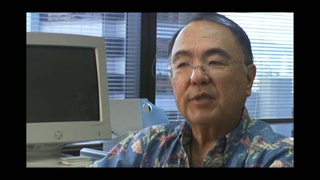Entrevistas
Losing his sister in camp
She got leukemia, a form of leukemia that uh she had to be hospitalized. And it took her a long time for her to die.
The hospital was outside of the camp proper, and uh where you had to go through a fence and guards to get... go to camp. So you couldn't visit. My mother was always there as I recall. And my father was there quite often. So we were left alone, most of the time. And it affected not me more than my younger sister because she never had a mother, you know. So, she blamed it on her sister for...being as a kid that is thinking terms of the jealousy factor, as competition.
But anyways she was um in hospital for a while. There's two things that they reckoned with prolonged her death was that uh she had a blood transfusion there. Just about everybody in that block gave blood, you know. And then the church was praying for her. That was the story I got. So the...my father told them, and mother said, I don't think...I think she's suffering too much so don't pray.
Well my mother never recovered. I'm sure she didn't. My father was um he was a real tough guy. In the sense that he knew what situation he was in. He never really showed this, saw this. He retained his dignity and his strength to not fall apart. And he kept saying now we must go on and all this kind of... You know, it was ganbatte. You know, he was really not um sort of you know in a state that he couldn't reorganize, keep the family together. He kept it together. I know it, I know I, he...he was quite upset...quite angry but it never showed He had to go along with the Japanese tradition. He had to be Nihonjin and not go into... you know fall apart.
So that was what... and then when my sister and broth..died... my..my sister died she was cremated. And then I understand a lot of them were buried too, right. But this is uh..my sister told me this the other day they were buried in a junkyard. You know? And uh in unmarked graves, you know, which they used to do in Germany, you know, with... with the victims, you know.
Data: June 29, 2012
Localização Geográfica: California, US
Entrevistado: Chris Komai, John Esaki
País: Watase Media Arts Center, Japanese American National Museum
Explore More Videos
Reação ao discurso de Mike Masaoka de 1942, Secretário Nacional da Liga de Cidadãos Japoneses Americanos (Inglês)
(n. 1915) Florista Nissei que se fixou em Nova York depois da Segunda Guerra Mundial. Integrante ativo do movimento sobre direitos civis dos Nipo-Americanos







